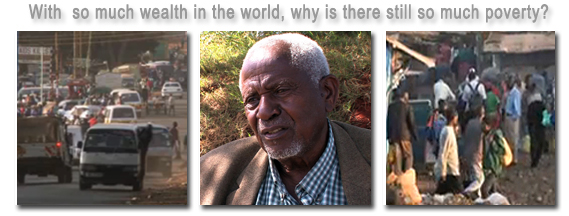
Q & A WITH PHILIPPE DIAZ (continued)
ID: An economist suggested that the people of the developing world should take back their resources the way the Bolivians did with their water. How feasible is it for the impoverished to empower themselves? The villagers of Kenya said themselves that they do not know how to lift themselves out of poverty. Furthermore, do you believe it is possible to return earth’s natural resources to the commons? And how do you see this being accomplished? Won't there always be continued opportunities for exploitation coupled with the reality of the rich not being motivated to change the status quo?
DIAZ: It is extremely difficult for people who are struggling every day to find food to feed their family to empower themselves to fight injustice. This is also one of the reasons for which we kept two third of the world in this situation of under-development: you don't rebel when you have to concentrate on finding food. Now, many grass-roots organizations have been fighting for decades and sometimes very successfully against these problems. For example the Movimento Sem Terra or the movement for the landless people in Brazil. A couple of their leaders are interviewed in the film. They have been fighting for many years to give back to local farmers idle lands in Brazil which are in the hands of land speculators. During the time we were with them, two or their local leaders have been shot dead by land owners. But no matter what these people will continue and step-by-step force the government to recognize and change these situations. It is clear that changes will not come from the top. The world leaders are part of the 20% of the world population who consume more than 80% of the planet resources. Why would they abandon their great lifestyle? Changes will come from the bottom when people are desperate enough to act like it happened in the past. What the movie shows in no uncertain terms is that the poverty issue in a situation as dramatic as the global warming one. When you have 20% consuming 80% of resources which is 30% more than what the planet can regenerate and knowing that world population increases, it simply means that unless we change our system drastically, we will have to plunge more people every year below the poverty line. There is no other way, In the meantime by doing that we create more and more people who cannot anymore buy the products we manufacture, plunging the world in economic crisis like the one we are in currently.
ID: Those in favor of free trade argue that it raises the welfare of all involved, so is the trade between the northern countries and the southern countries we see today really free trade at all? Do you believe there is any model of trade that would actually benefit the poor?
DIAZ: As we understand from the experts in the film there is no such thing as free trade. The system has been perverted from the beginning of modern times. And that was the only way for our very small European countries with out resources to build such empires. It is clear that if trade was becoming truly free with no string attached, the economies of the North would collapse immediately. Look at what happens when the producers of one resource like oil get together and fight decades of abuse. It's called OPEC and now oil producing countries are now some of the richest in the world. Traditional capitalism cannot allow a true free trade system; it would mean the end of its consumption pattern.
ID: Another economist discusses the need for a shift from growth to an "a-growth", society free of the need of growth. Do you see the possibility of realistically reducing growth in favor of equality?

